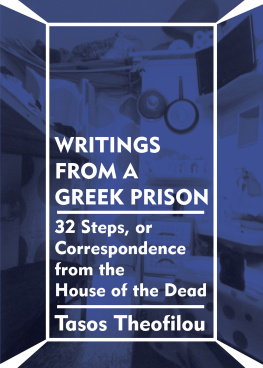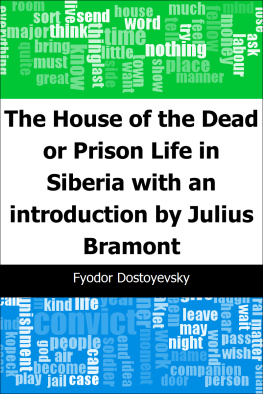WRITINGS
FROM A
GREEK PRISON
32 Steps, or
Correspondence
from the
House of the Dead
Tasos Theofilou
Translated by Eleni Pappa
Preface by Ben Morea
This edition 2019 Common Notions
This work is licensed under the Creative Commons Attribution-NonCommercial-ShareAlike 3.0 Unported License. To view a copy of this license, visit creativecommons.org/licenses/by-nc-sa/3.0/
ISBN: 978-1-942173-12-0
10 9 8 7 6 5 4 3 2 1
Dipli,
dipli.espivblogs.net
commonnotions.org/dipli
Common Notions
314 7th St.
Brooklyn, NY 11215
www.commonnotions.org
Copyedited and proofed by Erika Biddle-Stavrakos. Special thanks to Siuloong Englander.
Cover photograph by Tasos Theofilou
Cover design by Josh MacPhee / Antumbra Design
Layout design and typesetting by Morgan Buck / Antumbra Design
antumbradesign.org
Printed in the USA / Printed in the USA by the employee-owners of Thomson-Shore
thomsonshore.com
IN MEMORY OF THE ANARCHIST CHRISTOS POLITIS (19792018)
About Dipli
Dipli [] is a Common Notions imprint on social cannibalism. Funds raised go to political prisoners.
[DIPLI (/dipli/): literally, double. The double telephone line is the way prisoners from different prisons communicate. Two to five prisoners from different prisons call the same telephone number at a pre-arranged time. The owner of that telephone number, living outside prison, connects them together.
Social cannibalism describes a situation in which people, individually or in small groups, oppress and exploit others in their immediate social environment and within the limits of their daily action. The most powerful ones attack the weakest with quotidian manifestations of domination, authority or influence. Social cannibalism is the lowest level of individualism in an increasingly fragmented society. It does not manifest immediately and completely but develops incrementally. Social cannibalism is the zero point of counter-revolution from below (through hierarchies, divisions, manipulations) just as war is the zero point of counter-revolution from above (through repression, recuperation, and mediation).
The term came into use with anarchists in Greece following the robbery and murder of Manolis Kantaris in Athens in November 2011. Golden Dawn, an ultranationalist, far-right political formation in Greece, exploited that incident to organize a pogrom against immigrants that led to the killing of Alim Abdul Manan on December 5, 2011. Social cannibalism has since come to signify a contradiction in which people who generally denounce violence accept it against those separated from themselves when executed by those connected to them. It also represents a pattern in which parts of the proletariat face off against one another by turning oppression of oneself into stigmatization of the other. Finally, social cannibalism embodies the political context of the European Union/European Central Bank/International Money Fund memoranda, in which the Greek Debt Crisis/Eurozone Crisis is homogenized according to nationality and then differently moralized, internalized into guilt of ones worth as a person through the relationship between self and other, and shared representations of action, emotions, and the body.
To publish on social cannibalism is to account for both the previous cycles of struggle in Greece and the global capitalist restructuring today.
dipli.espivblogs.net
Editors Note
Anarchist-communist Tasos Theofilou was arrested by the Greek Anti-Terrorist Unit on August 19, 2012. At the Court of First Instance (November 11, 2013February 2, 2014), Theofilou was sentenced to twenty-five years of imprisonment for the charges of common complicity to homicide and the armed robbery of an Alpha Bank branch in Paros on August 10, 2012. He was acquitted of direct perpetration of homicide, joint constitution of and participation in the Conspiracy Cells of Fire (CCoF), and possession of explosives and war material. At the Court of Appeal (November 21, 2016July 7, 2017), Theofilou was acquitted of all charges. In 2018, Theofilou faced the danger of going back to prison due to an appeal lodged before the Supreme Civil and Penal Court of Greece [Areios Pagos] by one of its deputy prosecutors against the decision of his acquittal. The court rejected the appeal, and Theofilou was, definitively and irrevocably, acquitted of all charges. Theofilou spent five years in the prisons of Domokos and Korydallos. He was a member of the Network of Imprisoned Fighters and took part in a hunger strike (March 2, 2015April 10, 2015) with a series of demands against the most recent punitive turn of the Greek penal system.1 A wide solidarity movement supported Theofilou all these years.
The political case of Theofilou coincides with the implementation of the Economic Adjustment Programs (EAPs)aka the memorandabetween the Greek state, the Euro-area member states, and the International Monetary Fund (IMF).2 We can discern two distinct periods in how the EAPs are framed and moralized.
In the first period (20102015), which encompasses two EAPs, the Greek political personnel3 framed the Greek crisis as one of competitiveness and sovereign debt, by linking it on the one hand to clientelism and rent-seeking and on the other hand to the Eurozone crisis and the global financial crisis. They moralized the crisis by coercing the population to internalize guilt and responsibility for it, while turning the parts of the population who did not fit or comply into a public enemy. Privatization and direct and indirect social wage cuts ran parallel to the racialized and gendered criminalization of HIV-positive persons, intensified policing of the Roma population and migrants, and the brutal repression of anti-memorandum opposition.
In the second period (20152018), the Greek political personnel4 framed the Greek crisis as a humanitarian crisis, not by negating the framing of the first period but by linking it to the impact from the internal devaluation policy of the first two EAPs and the European migrant crisis. They moralized the Greek crisis by recuperating the anti-memorandum opposition, through the part of the population complacent enough to share responsibility for a national reconstruction plan and vote for and/or cooperate with the lesser of two evils. Structural adjustment, expansion of the population under workfare and/or NGOs/philanthropy, and over-taxation paralleled the promotion of a social and solidarity economy.
We publish Writings from a Greek Prison by Theofilou to contribute to an understanding of social cannibalism from the perspective of prisonizationthe extension of prisons and the lives they consume. We also want to draw attention to writings from the years of the memoranda that do not zero in on the social roles directly targeted by the EAPs, namely homeowners, self-employed or salaried workers, and welfare recipients. In this sense, the text by Theofilou is timely and rare. It provides an alternative angle on the years of the memoranda from the perspective of the surplus population in prison. The social relationships among inmates brings front and center a view of counterrevolution from below, while retaining in the background counterrevolution from above through the centrality of criminalization, penalization, and incarceration to contemporary capitalism.












